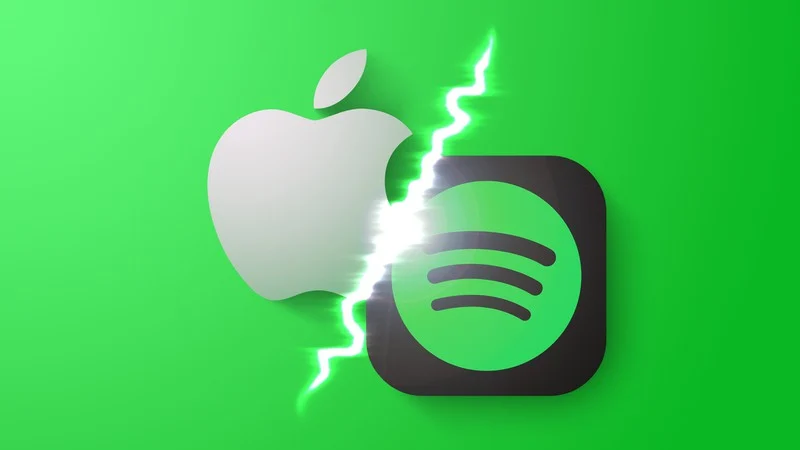Spotify Executive Justifies Antitrust Pressure on Apple and Calls for Other App Store Payment Providers

Spotify executive Horacio Gutierrez has got explained on a wide-reaching interview with The Verge why the company believes Apple is normally a "ruthless bully" and what it would like to see change.
Previous month, Gutierrez penned an op-ed in the Wall structure Street Journal that chastised Apple and some of its business practices. Now, Spotify's brain of global affairs and chief legal officer possesses extended on the logic behind the business's antitrust dispute with Apple.
Gutierrez's key justification underpinning the argument that Apple's App Retailer payment system isn't a necessary part of its organization is that it "wasn't area of the App Retailer initially."
Concretely, when it comes to the App Store, it is extremely clear that the choice to tie Apple's proprietary payment system to the App Store was an arbitrary choice. It wasn't area of the App Retailer initially, just as the thirty percent Apple taxes wasn't a requirement whenever we made it in to the App Retailer. They bolted that on later on in the process and in carrying out that, they developed this environment where competing apps need to cope with Apple's private music streaming service along with other competing products on what's not really a level playing field.
Apple's thirty percent commission on App Retailer sales and in-app purchases was also raised as an "arbitrary price," and Gutierrez explained that it's not merely a decrease in commission that Spotify is seeking to achieve.
The issue is not if the rate is 30 or 15 or ten percent, the issue is that the rate is arbitrary plus they reach set it unilaterally because they've insulated themselves from competition. What should happen is Apple will be able to fee 30, or 50 percent, if they can convince users in market economy that the worthiness that they offer justifies the thirty percent, or the 15 percent, or the 50 percent. What we're saying is they essentially prevent competitors from coming in and offering alternative repayment systems, and therefore there is no market.
Gutierrez explained that Spotify wish to see Apple go back to its previous methodology with the App Retailer and loosen its hold on guidelines and penalties.
We want Apple to return to the problem that existed at that time when we joined up with the App Retail store. We want them to undo the tying of their proprietary repayment system to the App Retailer and all of the other anti-steering provisions, that is a fancy way of declaring punishments and penalties that they've designed for those people who do not wish to employ their proprietary payment program. Basically, restore the situation to the way it had been before their anti-competitive misuse started.
Especially, Gutierrez said that the market should be able to choose from an array of payment systems in the App Store, and that Apple will be able to cope with other payment technology in a far more competitive environment.
There exists a monopoly about payment systems, which is why they can afford to impose the thirty percent. Let the market decide. Enable PayPal and Mastercard and other new payment systems to can be found in and then permit users decide, vote with their dollars on whether Apple's technology is indeed superior in terms of payment and each one of these other activities that they’re willing to pay thirty percent more.
Addressing criticisms that Apple's rules and costs are valid given it built and keeps the App Store and the devices software run on, Gutierrez discussed that Spotify believes this should not be considered a reason to permit anticompetitive conduct.
There is no reason why a platform provider that's supposed to be a neutral platform provider like Apple will be permitted to create conditions that would force companies like ours to have to make that choice. They state, "Well, but we built it." Yeah, you created it. However when you made it it wasn't like that. It was significantly constructed on the backs of the work of many app developers that found the App Retail outlet that you touted as the key reason why people should come and make use of your system. And whether you made it or not, it really doesn't subject from an antitrust point of view. The railroad companies designed the railroads, the metal companies built the metal mills, and calling companies built calling lines… The largest cases in the annals of antitrust enforcement in the U.S. had to do with companies that had developed that infrastructure and used the energy that that control offered them to hurt competitors.
In April, the European Commission discovered that Apple had breached EU competition law with Apple Music and the Senate Judiciary Antitrust Subcommittee questioned Apple's App Store policies.
Tags :
Previous Story
- Apple Rumored to look at OLED Displays found...
- Samsung Reportedly Begins Development of 120Hz Display for...
- Apps Reportedly Limited to Optimum of 5GB RAM...
- Yes, the old Magic Keyboard gets results on...
- Apple Announces New Background Sounds, Apple Look at...
- Redesigned MacBook Pro Models With 10-Key Apple Silicon...
- Apple's Security Compromises found in China Outlined in...
- 12.9-Inch iPad Pro Now Delivers as Late as...